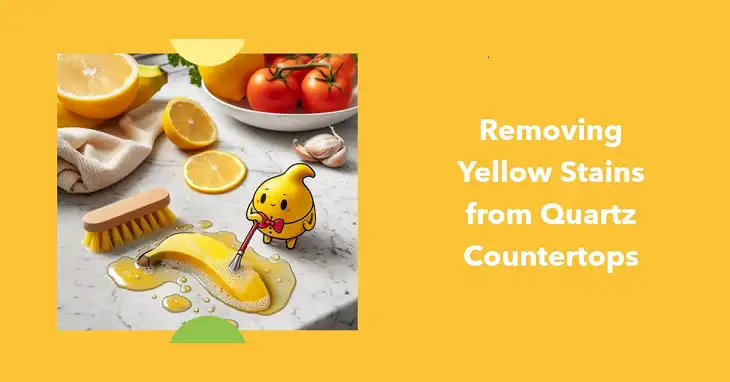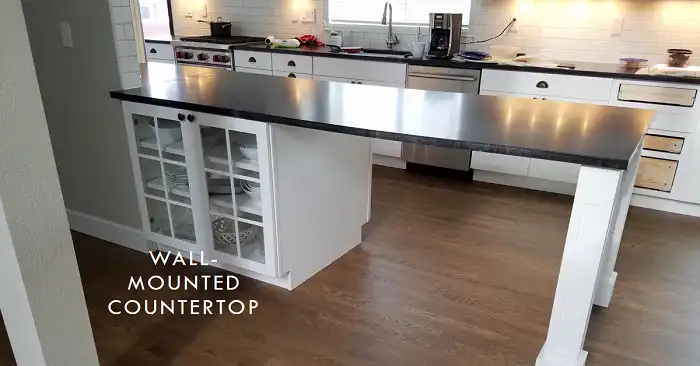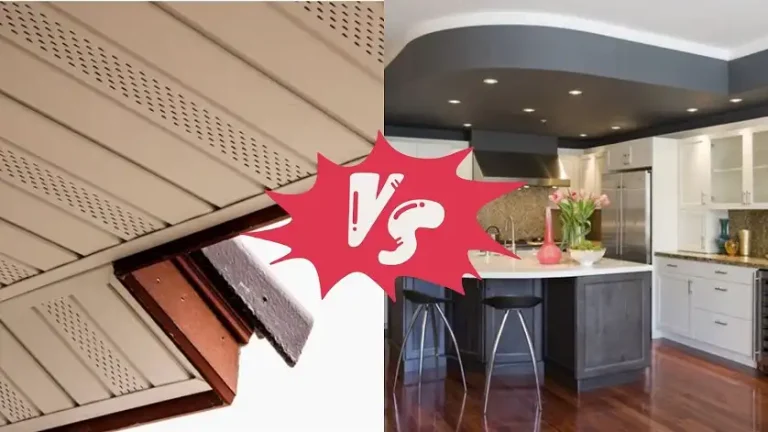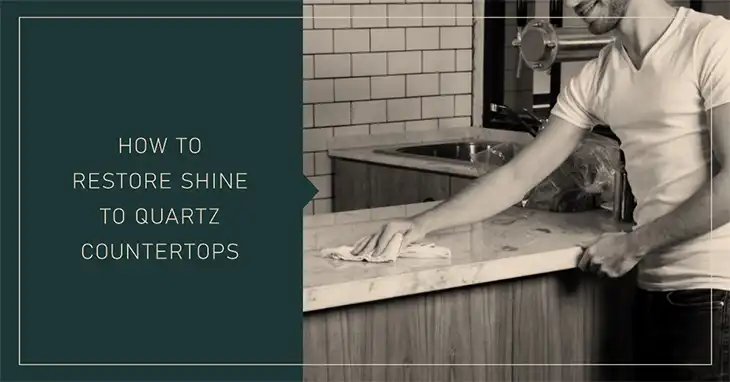How to Fix Dull Spots on Quartz Countertops
Quartz countertops are a popular choice for modern kitchens and bathrooms. Their sleek, non-porous surface offers a luxurious look that’s also easy to maintain. But even with proper care, dull spots can appear over time, marring their beautiful finish.
These unsightly blemishes are often caused by hard water stains, mineral deposits, cleaning product residue, scratches, or etching from acidic substances. Left unchecked, they can make your once-gleaming countertop look dull and worn.
Don’t worry – with the right techniques, you can restore your quartz countertops to their former glory. This article will show you how to diagnose and tackle those pesky dull spots, no matter the cause.
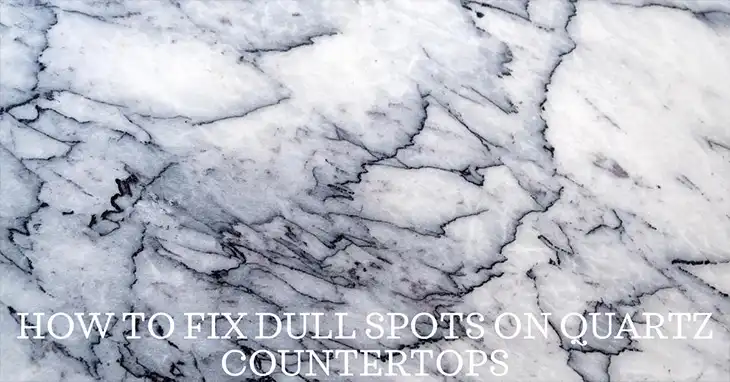
How to Identify the Cause of the Dull Spot on Quartz Countertop
Before you can fix a dull spot, you need to pinpoint what’s causing it. Start by giving the affected area a close visual inspection.
Hard water stains and mineral deposits often appear as white or cloudy spots on the surface. They’re caused by the minerals in your water supply, like calcium and magnesium, leaving behind residue as the water evaporates.
Etching, on the other hand, leaves a dull, rough texture on the quartz. This is typically the result of exposure to acidic substances like citrus juices, vinegar, or certain cleaning products.
Scratches can also cause dullness, appearing as lines or grooves on the countertop’s surface. These are usually caused by abrasive cleaners, scouring pads, or dragging heavy objects across the quartz.
Once you’ve identified the culprit, you can move on to the appropriate cleaning and restoration techniques.
How to Clean Surface Stains with Basic Cleaning Methods
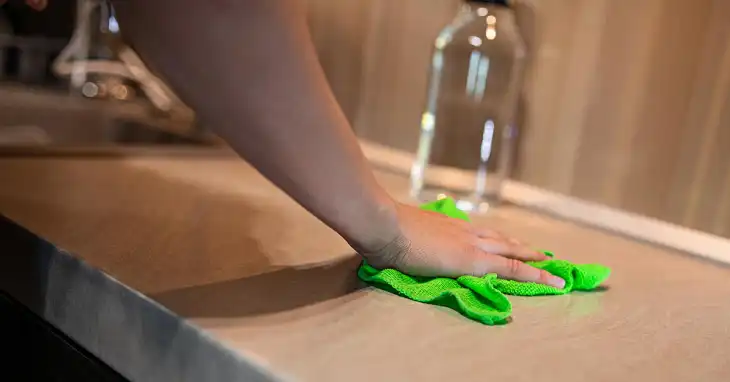
For surface-level stains and light dullness, start with the gentlest cleaning methods. This will help avoid further damaging the quartz surface.
DIY Baking Soda Paste
One of the most effective yet gentle solutions is a simple paste made from baking soda and water.
To make the paste:
- Mix equal parts baking soda and water in a small bowl until it forms a thick, spreadable consistency.
- Using a soft cloth or sponge, gently buff the paste into the dull spot in a circular motion.
- Let it sit for a few minutes to allow the baking soda to work its magic.
- Rinse the area thoroughly with clean water and dry with a microfiber cloth.
This mild abrasive action can help lift stains and restore the shine without scratching the quartz surface.
Mild Dish Soap Solution
For general cleaning or lighter stains, mix a few drops of mild dish soap (like Dawn) with warm water. Using a soft cloth or sponge, gently wipe down the affected area. Avoid using abrasive sponges or scrubbing too vigorously, as this can cause scratches.
Rinse the area thoroughly with clean water and dry with a microfiber cloth to prevent water spots.
Window Cleaner for Grease and Oil
Stubborn grease or oil stains can be tough to tackle, but a non-ammonia window cleaner can help cut through the grime. Spritz the cleaner onto the stain, let it sit for a few minutes, and then wipe it away with a clean cloth or paper towel.
How to Clean/ Fix Tougher Dullness with Advanced Methods
If gentle cleaning methods aren’t cutting it, you may need to employ more advanced techniques. But proceed with caution – these should only be used on severe dullness or stains that won’t budge with gentler methods.
Super-Fine Steel Wool
For particularly stubborn stains or dullness, a super-fine steel wool (Grade #0000) can provide a gentle abrasive action. Dampen the steel wool and gently rub the dull spot in a circular motion, applying light pressure.
Be extremely careful when using steel wool on quartz, as it can easily scratch or damage the surface if used improperly. Avoid using it on textured or polished quartz finishes altogether.
After scrubbing, rinse the area thoroughly and dry with a microfiber cloth.
Commercial Quartz Cleaners
If the dullness persists after trying the above methods, it’s time to bring out the big guns – commercial quartz countertop cleaners. These are specifically formulated to effectively clean and restore the shine to quartz surfaces.
Follow the manufacturer’s instructions carefully and always test the cleaner in an inconspicuous area first to ensure it won’t cause discoloration or damage.
How to Polish and Buff Your Quartz Countertops for a Lasting Shine
Once you’ve successfully removed the dull spot or stain, you may need to polish the area to fully restore the quartz’s natural shine and luster.
Polishing Compounds and Buffing Pads
Invest in a high-quality polishing compound and buffing pad designed specifically for stone surfaces like quartz. These products will help smooth out any remaining surface imperfections and bring back the countertop’s glossy finish.
Follow the manufacturer’s instructions for application and buffing techniques, working in small sections to achieve a seamless, uniform finish.
How to Prevent Dullness in Quartz Countertops
While dull spots can be frustrating, the good news is that they’re often preventable with proper care and maintenance.
Daily Cleaning Routine
Establish a daily cleaning routine using a microfiber cloth or soft sponge and a gentle, non-abrasive cleaner. This will help remove dirt and grime before they have a chance to build up and dull the surface.
Wipe Up Spills Immediately
Don’t let spills sit on your quartz countertops – wipe them up right away. Acidic substances like citrus juices, vinegar, and wine can etch the surface if left to linger, while other liquids can leave behind stains or mineral deposits.
Use Cutting Boards and Trivets
Protect your countertops from scratches and heat damage by always using cutting boards and trivets. Never cut directly on the quartz surface or set hot pots or pans directly on the countertop.
Consider a Sealant
For an extra layer of protection, consider using a quartz cleaner with a built-in sealant or protectant, like ioSeal. These products help create a barrier against water spots, stains, and other damage, making it easier to keep your countertops looking their best.
frequently asked questions
Can I use vinegar or lemon juice to clean my quartz countertops?
While vinegar and lemon juice can be effective at removing hard water stains and mineral buildup, they should be used with caution on quartz surfaces. Both are acidic and can potentially etch or dull the quartz if left on for too long or not rinsed properly.
If you do use these mild acids, be sure to dilute them with water and rinse the area thoroughly after cleaning.
What’s the best way to remove hard water stains and mineral buildup?
For hard water stains and mineral deposits, try making a paste with baking soda and water. Gently buff the paste into the affected area using a soft cloth or sponge, let it sit for a few minutes, and then rinse thoroughly.
You can also try using a plastic putty knife to gently scrape off stubborn deposits without scratching the quartz surface.
Can I use quartz countertop cleaners on other stone surfaces?
While quartz-specific cleaners are formulated for use on quartz surfaces, they may not be suitable for other types of stone like granite, marble, or limestone. These surfaces have different compositions and may require different cleaning products and techniques.
It’s best to use cleaners specifically designed for the type of stone you have to avoid potential damage or discoloration.
How often should I polish my quartz countertops?
There’s no hard and fast rule for how often to polish quartz countertops, as it depends on factors like usage, cleaning habits, and the level of wear and tear. However, most experts recommend polishing once or twice a year to maintain that lustrous shine.
If you notice your countertops starting to look dull or lackluster, it’s a good indication that it’s time for a polish.
I have a textured or honed quartz finish. Can I still use the techniques in this guide?
Some of the more abrasive techniques, like using steel wool or aggressive polishing, may not be suitable for textured or honed quartz finishes. These surfaces have a different texture and can be more susceptible to damage from harsh abrasives.
Stick to gentler cleaning methods, like using a baking soda paste or mild dish soap solution, and avoid anything that could potentially scratch or alter the unique texture of your countertops.



